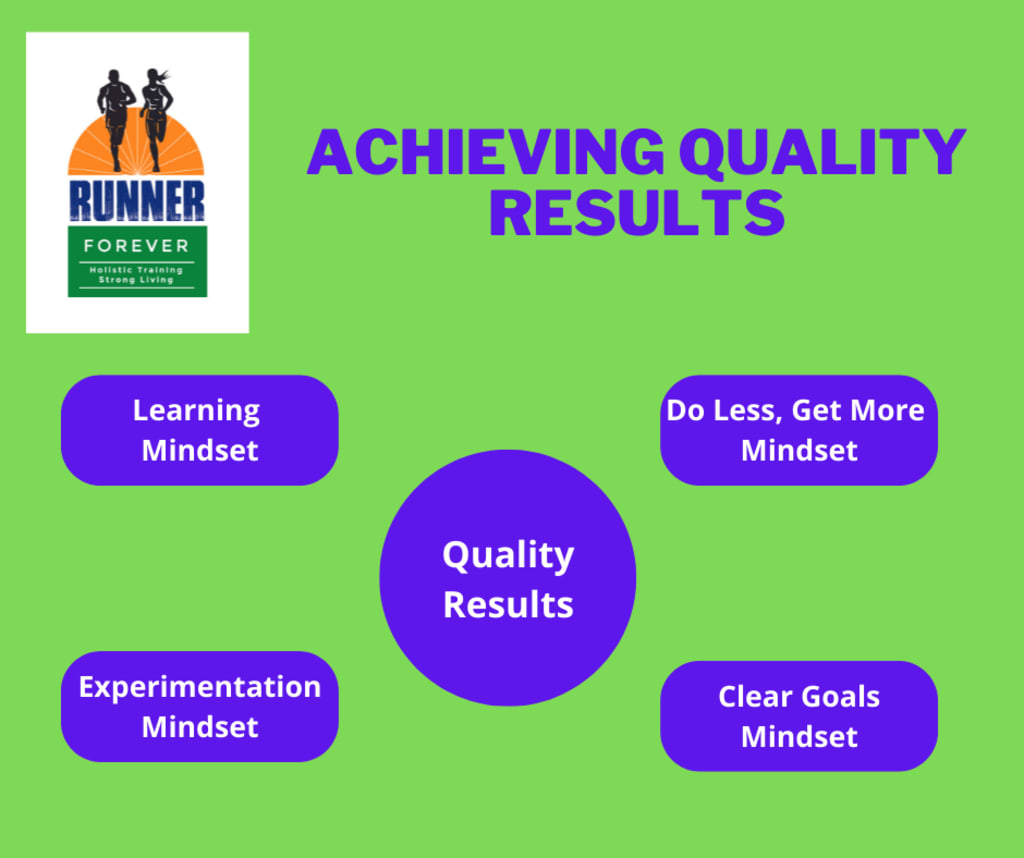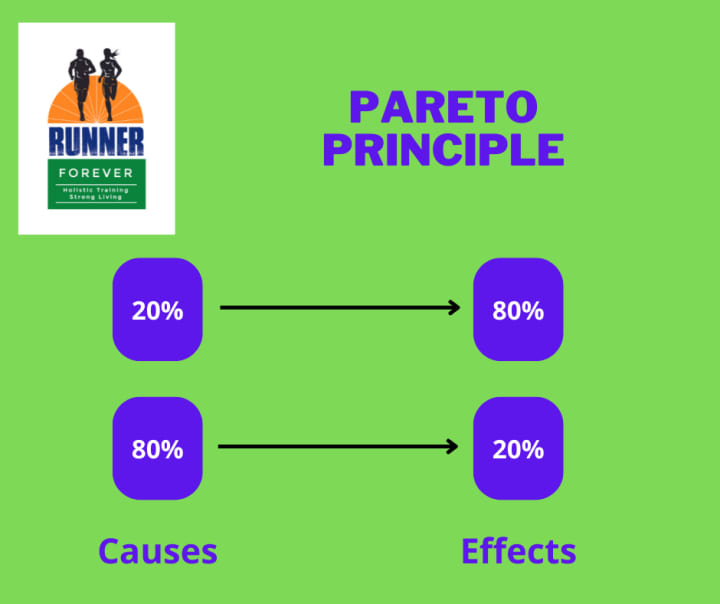4 Mindset Changes You Need, To Get Quality Results in Your Health and Wellness Journey
Four critical pointers including the Pareto principle, to get the most results in your health and wellness journey.

"I am overwhelmed with what I have been doing in my wellness journey, It is a bit demotivating"
"It is taking way longer than I thought, to get the results that I wanted to see"
"How do I do very few things but get the most results to feel healthier?"
If you have said these as a client or heard these as a coach, this article is for you.
What is overwhelming people in attaining the wellness results that they want to see? Why people are getting demotivated in their wellness journey? Where/Why/How they are going wrong? These are some of the compelling components of this article.
By continuing to read, you will have a few takeaways that you could apply to your wellness journey to your client to get better results. I would try to share as many examples as possible from my experiences as an individual and as a coach. Sometimes, it took time for me as well to figure o what works and what gets the results. That's something to be noted.
There are 4 key takeaways from a mindset standpoint. Let's understand what they are.
Learning Mindset
One of my friends had called and asked me to help him with his wellness needs. When I asked him what he wants to achieve, he shared he wanted to build his fitness levels. By asking him a few more questions, he was able to define better his fitness improvement needs. It seems he had tried to watch a video in which a fitness expert performed HIIT exercise for 15 minutes which my friend could not do at a stretch and he wanted to do that as a goal.
He also mentioned, "Since I don't have time or cannot spend time, I like to take your expertise and help in achieving this fitness improvement and doing it in the right ways". Though I felt glad he reached out to me for his needs, I also saw that he could spare time in learning some of the basics.
Well, you may ask, "Why do we need coaches in that case?". Yes, that's a very valid question. While coaches are available to help you achieve your needs and results, it really helps if you also could do your learning in your journey to attaining your health and wellness.
Let me share why I am saying that. When you do your own learning (even 10 minutes reading or watching a video on a day), it comes a long way in being more responsible and committed to achieving your wellness goals.
When you don't do that learning, you are either blindly following your coach or sometimes regretting your delay in achieving your goals. Your self-learning adds a bit of magic to your wellness journey, is my point.
Have that learning mindset apart from engaging coaches. It is also about developing learning habits than planning and achieving a short-term plan and small results temporarily.
You want to make a huge difference to yourself through the learning process that you go through apart from achieving the results.
When my clients leave my programs after achieving their goals, they are equipped with knowledge and skills using which they can sustain in their wellness journey, lifelong.
Experimentation mindset
What do you mean by experimentation mindset? Why should I spend time experimenting when I pay my coach? How would it help me?
If these are some of your questions, let me help you with more pointers.
Let me first share what it is and when I learned about this experimentation mindset.
After finishing my first marathon, I developed a serious ITB injury. It is a running-related injury that most runners in the world get. Though I initially approached doctors and physiotherapists(PTs) to recover from it, I discovered that they are not able to help as much as I expected(no offence intended!). Doctors said, "stop running" and PTs gave a few rounds of electrical therapy which didn't seem to bring any positive effect.
That's when I started learning what people across the world do to recover from ITB injuries. I discovered the aspect of cross-training for the first time. I learned that runners across the world do things like swimming, cycling, and yoga to stay injury-free, yet build fitness to meet their race goals.
I started doing yoga as a cross-training to start with. Just doing Surya Namaskar regularly, changed my running and recovery process in a huge way. I soon recovered from the injury and ran ultramarathons.
In that process, I learned that I had to experiment with Yoga as a cross-training to recover faster from the injury and at the same time, recover better from running mileage through doing yoga as a cross-training regimen.
As another example, I worked on myself to lose my waist size and lose my weight a bit, building more muscles and losing the fat that I had built during the pandemic. I made a few diet and nutrition changes through my experiments and I could achieve visible results. I lost 2 inches of waist and 3 kg of weight. I also upped the intensity of my exercise regimen. It helped me achieve a new personal best in a 10K race (48.28).
I believe I could achieve that through my self-learning and experimenting mindset. Of course, through the process of becoming certified nutrition and weight management coach, I learned the concepts that I could apply confidently.
In a nutshell, an experimenting mindset is very powerful. It starts with learning as a first step and then realizing the fact that our bodies are unique and we need to serve them in a unique way, that is only possible when we experiment and discover the truths about our bodies.
"Do Less, Get More" mindset
I know this may sound a bit like taking a shortcut to get the results. If you felt so, it is not.
If you have not heard about the Pareto principle, it states that 80% of the results (effects) can be achieved by just 20% of the efforts (causes).

Let's say, you are working on a weight loss program. You can actually achieve 80% of the weight loss through your diet and nutrition changes vs. working out in a gym for two hours daily. In the latter case, you may actually burn out more than achieving results.
Another example. Many of my clients who are progressing well through "Running" program, are following 80/20 method per my guidance and the training plans which I provide. To achieve the best of their timing improvements, they are running 80% of their runs at very low intensity while only 20% of the runs run at moderate to high intensity. Many amateur recreational runners believe the myth that they need to be running most of their runs faster to get better speed/pace performance improvements. If you like to understand more, you may read the book 80/20 running by Matt Fitzgerald.
"Clear Goals" Mindset
Most of the time, not having a clear goal is a major problem. This is the reason, I ask my clients a lot of questions before we together arrive at what the client wants before I even start to help them with what I offer.
Defining a clear goal is as good as achieving 50% results. If you do not define a clear goal, you would be spending significant time defining your goal through what you do. The process of discovery (though it is good!) itself will take longer than you expect in just getting better clarity about the goal.
More than defining a timeline for your goal, it would help a lot more if you could define the right steps that you will take to achieve the goal, will also help.
For example, if you are planning to run your first 5K. The goal is very clear and it is to run a 5K distance non-stop. Instead of saying, I would run 5K in two months, it would help to understand how it is going to be achieved and if would it be possible realistically. How about saying, "client also wants to stay injury-free in the process of achieving that goal". Planning is always good, but it should not be written on stones, in my view. As and when you discover how you are doing with the plan, you should have the full freedom to change the training plan be it extending the timeline or shrinking it based on how the client is coping which is very important.
Summary
I hope this article provided you with some nuggets to think about in your health and wellness journey.
I know it is overwhelming sometimes with all the plethora of information available on the internet and what to follow. Again, it comes back to the experimentation mindset so you can start to discover what works for you and what does not.
Achieving quality results in your goals should not be exhausting. It should be an enjoyable process if you do it the right way. Having the right mindset is very important in that path.
If you are thoughtful about your actions, you can get results faster and easier.
If you liked my article, please leave a ❤ and subscribe.
About the Creator
Ganesh Kuduva
LinkedIn Top Voice | Founder - Runner Forever | Health & Wellness Coach | Author of BE A RUNNER FOREVER (Available on Amazon) | Corporate H&W Speaker | Follow me for posts on Health and Life Skills (www.runner-forever.com)
Reader insights
Outstanding
Excellent work. Looking forward to reading more!
Top insights
Compelling and original writing
Creative use of language & vocab
Easy to read and follow
Well-structured & engaging content
Excellent storytelling
Original narrative & well developed characters
Expert insights and opinions
Arguments were carefully researched and presented
Heartfelt and relatable
The story invoked strong personal emotions
On-point and relevant
Writing reflected the title & theme






Comments (1)
Very useful advice to anyone starting his or her journey.